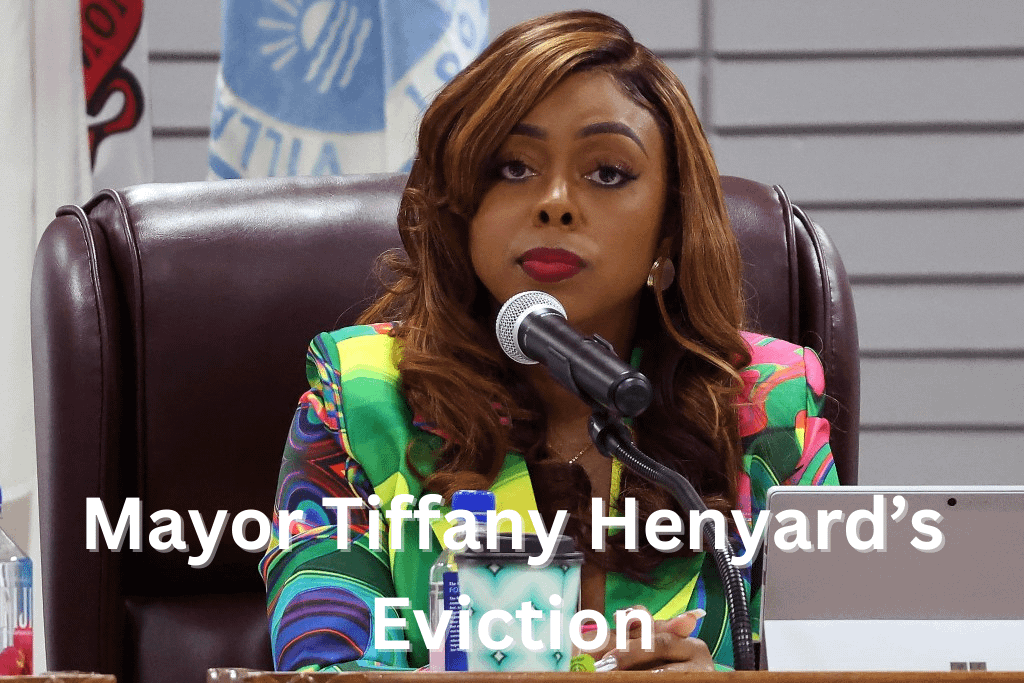The recent news surrounding Dolton, Illinois Mayor Tiffany Henyard has sparked widespread attention, as the mayor faces a potentially career-impacting eviction dispute. Allegedly stemming from unpaid rent, the eviction story has grown to reveal layers of political tension, legal implications, and social media controversies. This article will break down the key details of Mayor Henyard’s eviction case, examine its impact on the Dolton community, and look at the broader implications of this unfolding saga.
The Background: Eviction Notice and Unpaid Rent Allegations
The eviction troubles of Mayor Tiffany Henyard began with reports indicating that she had not paid rent on her residence, leading her landlord to initiate eviction proceedings. According to public records and statements from her landlord, Henyard allegedly failed to meet her financial obligations for an extended period. The issue escalated when Cook County sheriff’s deputies attempted to serve her eviction papers, a step that legally formalizes the eviction process and typically signals that the tenant has been unresponsive or non-compliant.
Genetta Hull, the landlord involved in the case, has spoken out about her frustrations, expressing that the situation has placed her in a financially precarious position. Hull claims that despite repeated attempts to resolve the matter privately, Mayor Henyard has yet to fulfill her rental obligations. This publicized dispute over unpaid rent not only calls Henyard’s financial reliability into question but has also raised concerns about her responsibilities as a public servant.
Mayor Henyard’s Response and Social Media Backlash
As the legal process continued, Mayor Henyard took to social media to respond, albeit in an unconventional manner. In a live Facebook rant, Henyard reportedly threatened legal action against her political adversaries, suggesting she might pursue arrests for those she believed were fueling her troubles. This response ignited widespread debate on social media platforms, with residents, opponents, and supporters alike questioning her approach to the situation.
Henyard’s Facebook live rant has drawn criticism not only from local constituents but also from political commentators and news outlets nationwide. Her rhetoric, which some described as “rambling,” has prompted questions about her ability to manage crises effectively and maintain professional composure under pressure. The accusations she leveled against her detractors have further polarized the community, with some defending her right to speak openly and others perceiving her remarks as an abuse of power.
The Legal Process: Cook County’s Role in the Eviction Proceedings
The eviction process has involved the Cook County Sheriff’s Office, which plays a central role in enforcing eviction notices across the county. Once a landlord files an eviction suit and receives a court order, sheriff’s deputies are responsible for serving the eviction papers. This measure, which legally binds the tenant to respond, has become a focal point in Mayor Henyard’s case. Reports indicate that deputies faced challenges in serving the eviction notice, allegedly due to Henyard avoiding direct contact with officials—a claim that has not been officially substantiated.
The involvement of the sheriff’s office in this case has highlighted the legal procedures surrounding evictions in Illinois and underscored the seriousness of Henyard’s situation. While the mayor has legal avenues to contest the eviction if she chooses, the process itself could have long-lasting effects on her public image and political career. Evictions for public figures, especially those in leadership roles, often carry a unique stigma, and Henyard’s case is no exception.
The Broader Political Climate in Dolton
Mayor Henyard’s eviction case unfolds in a climate of heightened political tension within Dolton. Since taking office, Henyard has faced several challenges, including controversies surrounding her leadership style, handling of public funds, and relationship with other local leaders. Her recent social media statements have exacerbated pre-existing political divides, adding fuel to an already tense atmosphere.
Some Dolton residents view this eviction case as a symptom of deeper issues in Henyard’s administration, pointing to what they perceive as a pattern of mismanagement and contentious governance. Political opponents have seized on the eviction story as evidence of her alleged failings, arguing that the incident reflects poorly on her commitment to ethical leadership. Conversely, her supporters argue that she is being unfairly targeted by a political machine that resists change, asserting that her eviction case is being used as a tool to discredit her.
Community Reactions and Public Sentiment
Public reactions to Mayor Henyard’s eviction case have been mixed. Some residents express sympathy, viewing her financial issues as personal matters that should not affect her role as mayor. Others, however, argue that a public official’s finances are reflective of their ability to manage public funds and maintain integrity in office. This divide is evident on social media, where Dolton residents have voiced both support and criticism, often citing their personal experiences with Henyard’s policies and leadership.
For some residents, the eviction controversy has eroded trust in the mayor’s administration. As the story gains traction in local and national news outlets, public sentiment may shift further, potentially impacting Henyard’s ability to govern effectively. If she fails to address the situation transparently, she risks alienating constituents who may already feel disillusioned with her leadership.
Implications for Mayor Henyard’s Political Future
The eviction case presents a significant obstacle for Mayor Henyard, who must now balance her legal responsibilities with the demands of public office. If she cannot resolve her rental obligations promptly, the situation could become an enduring distraction, impacting her effectiveness as mayor and jeopardizing her chances of reelection. Additionally, the social media backlash and public scrutiny may create lasting reputational damage, affecting her ability to garner support from both constituents and colleagues.
For a public official, financial issues often raise questions about accountability and integrity. While eviction is a personal matter, Henyard’s public position amplifies its significance. Constituents may see this as indicative of her capacity to manage public funds, further complicating her ability to build and maintain trust within the community.
